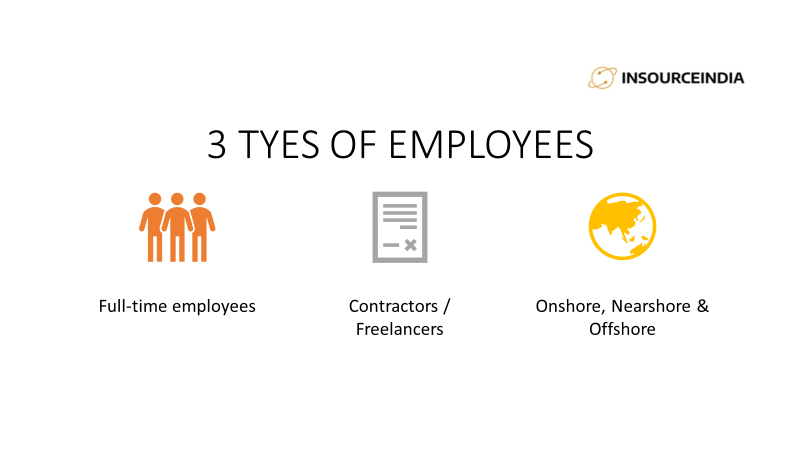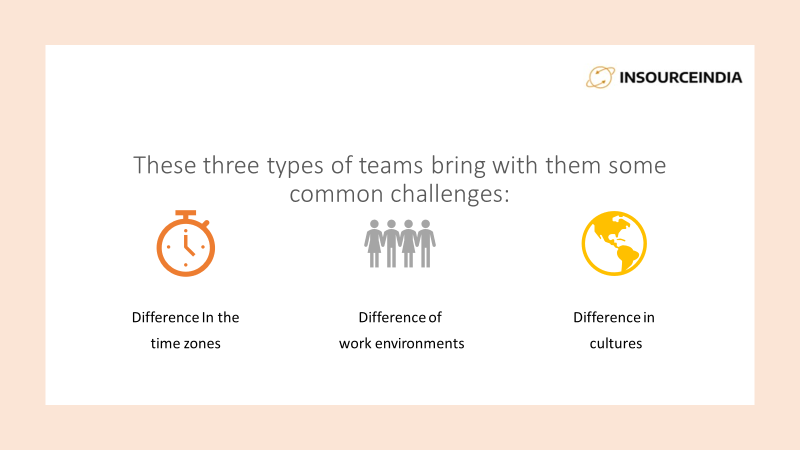With Remote working, WFH (Work from Home), Work from anywhere (WHA) & Workcations becoming the new norm there is a strong need for effective communication across distributed offshore teams. In fact, more than 70% of Tech companies in India now employ remote workers or have Work from home option. While there are some major benefits to WFH, there are a few challenges too when it comes to distributed offshore teams – especially on the communication front. Bridging time & cultural gaps, as well as building constructive relationships with people geographically far away is not always easy.
Distributed offshore teams come in many shapes and sizes & formats. Distributed teams are generally comprised of the standard or “Home” team in place at a company’s home office, plus the addition of the following:
- Full-time employees working from a different geographic location in India than the main office
- Contractors / Freelancers (Remote workers)
- Onshore, Nearshore & Offshore outsourced teams
These three types of teams bring with them some common challenges:
- Difference In the time zones
- Difference of work environments
- Difference in cultures
Differences could apply to Team leaders who are leading the offshore teams, developers, project managers etc.
Hence let’s get to know how we can improve communication with Offshore Teams:

- Clarity in communication
Clear Communication is always a good thing. When it comes to long distance or cross-cultural communication, a Clear communication with level of detail in communication is the key. With remote working there is an absence of in-person meetings and becomes difficult to read body language. It’s better to clearly communicate information to ensure all parties are on the same page.
- Take advantage of communication tools
There are many Communications tools available for distributed teams these days. Tools like Slack, Zoom, Skype, JIRA, Base Camp are highly effective to get the message across to your offshore teams. When working across geographic distances, make use of these tools to facilitate communications. You can share project status and updates and connect. Most tools allow for adding comments and maintain a record of all content shared and communicated, meaning that the content is searchable, and it is easy to go back and refer to previous notes & Discussions. This is helpful the offshore teams that are working at different time zones.
- Schedule video calls with the team regularly
Communicating via messaging platforms is good. But video calls would be even better. It is important to put a face to name and build that rapport with your team. There’s something positive and impactful about seeing your teams on a Video call & and video chats can be just as effective as in-person meetings. Video calls also helps the team to connect and achieve better trust, which in turn improves the effectiveness of communication overall.
- Ask relevant questions to your offshore team
When it comes to communicating with people from different backgrounds or cultures, it can sometimes be hard to find a middle ground immediately. A bit of “Icebreakers” are required now & then. Asking questions is a good way to learn more about one another, including cultures, preferences, and details about the working environment and project updates.
- Consider each other’s culture
While working on development may seem universal & Common, cross-cultural differences can highly impact communication and functioning of your teams. Cultural differences do exist & be sure to consider you may not be viewing or interpreting things the same exact way as your offshore team does. Be sensitive to varying expectations, norms, and standards of members of teams in other locations, and don’t make assumptions. Cultural diversity is truly important and a great benefit to working with a distributed offshore team.
- Find common time zone & hours
Your offshore team would be working at different time zones. Whenever possible, find hours where both parts of the team (onsite and offshore) are available. An essential window needs to be created where all team members are logged on at once, even if it’s only a few hours per week. Make sure that this time window is well-communicated, and always log on when planned. This allows all team members to know when they’ll have a chance for a live chat and sets an expectation about when synchronous conversations can occur.
- Plan well & be prepared for plan B
It is always good to plan well and be prepared. Always know what the next plan or plan B is so there isn’t any downtime for the team.
-
- Stack up your JIRA or project management queue accordingly.
- Assign out tasks in advance.
- Ensure that team members don’t get stalled or delayed if they’re in different time zones and not working concurrently.
- Create SOP’s (standard operating procedures) in case of contingencies.
- Align offshore team around companies’ vision, mission & goals.
It’s essential to show the Companies Vison, Mission & define the end goal upfront with your offshore team. This enables everyone to align around a central goal from the start of the project, regardless of location, Time, and various other differences. Aligning your onsite and offshore teams around a goal is a best practice that helps facilitate effective communication and ensures that everyone is working towards the same common goal & result.
- Keep the offshore team organized
When working across teams, it is very important to remain organized. Document as much as you can. Keep notes on work to be done and follow consistent processes which all members of the team understand and have access to. Keep things simple, organized, and straightforward whenever possible. Less confusion and clear instructions and standardized processes will lead to more effective communication across the distributed offshore team.
- Be inclusive in nature
Be sure to include all necessary team members in important decisions or events. Even if an offshore team cannot attend in person, keeping your team in the loop allows them to feel included and thus more cohesive.
Sending Meeting updates, Notes from Management, Newsletters, Company updates etc are truly important for the offshore team. Make the offshore team feel valued & included. They will be more apt to communicate, and the entire group will benefit from Inclusion.
Planning thoughtful communication with offshore software development teams is necessary for the timely project completion. So, whether you’re working onsite or offshore, these communication best practices will help ensure the entire team is cohesive and collaborates well.


